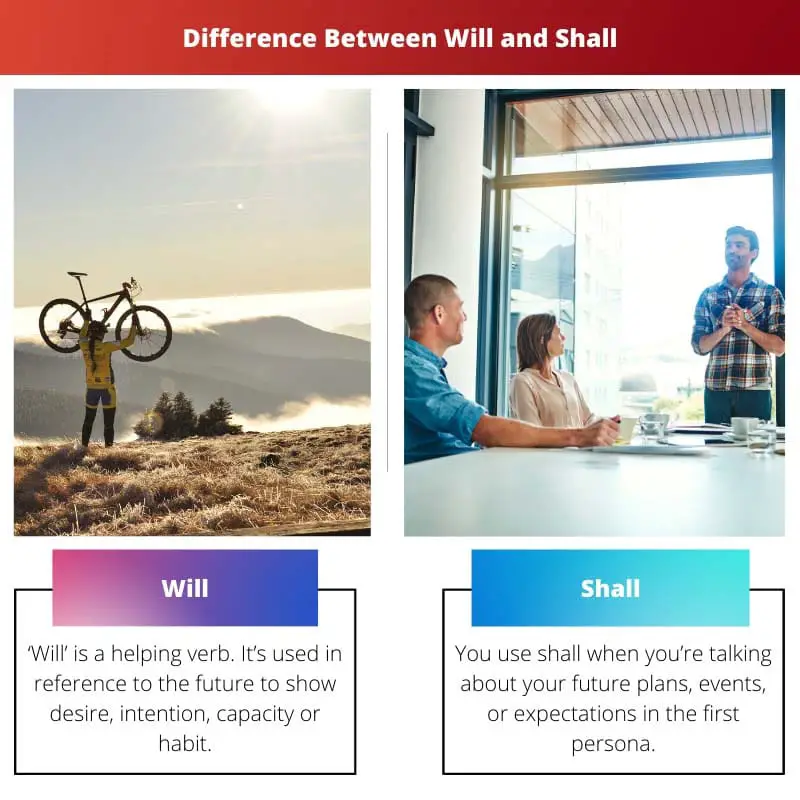“Shall” indicates a suggestion, intention, or future action in a formal or legal context, emphasizing duty or obligation. “Will,” on the other hand, conveys a simple future tense indicating a voluntary action or a prediction.
Key Takeaways
- “Will” and “shall” are both modal auxiliary verbs used to express future actions, but “will” is more common and less formal than “shall.”
- Traditionally, “shall” is used with first-person pronouns (I, we) to indicate future actions, while “will” is used with second- and third-person pronouns (you, he, she, it, they).
- In modern usage, “will” is widely used for all subjects, whereas “shall” is increasingly rare and reserved for formal or legal contexts or to emphasize strong determination or obligation.
Will vs Shall
“Will” indicates simple future actions or intentions, while “shall” indicates future actions with a sense of determination or to make suggestions. “Will” is used more commonly in spoken English, while “shall” is more common in formal or written English. Example: “I will go to the store” vs. “We shall proceed with the plan.”

Examples: 1) I ‘will’ surely complete all the assignments. 2) ‘Shall’ we dance?
Comparison Table
| Feature | Will | Shall |
|---|---|---|
| Most Common Usage | All persons (I/we, you, they) for future tense, predictions, and willingness | Primarily in questions with “I” and “we” and in very formal statements |
| Future Tense | ✅ (all persons) | ❌ (except for questions with “I” and “we” in specific contexts) |
| Predictions | ✅ | ❌ |
| Willingness | ✅ | ❌ |
| Requests | ✅ | ❌ |
| Offers/Suggestions | ✅ (informal) | ✅ (formal) |
| Obligations | ✅ (informal) | ✅ (formal) |
| Formality | Less formal | More formal |
| Modern Usage | More common and preferred | Less common, primarily in formal contexts and specific phrases |
When to Use Will?
Expressing Future Intentions or Predictions
- Voluntary Actions: “Will” is commonly used to express actions that a person intends to perform voluntarily in the future. For instance, “I will visit my friend tomorrow.”
- Predictions: It is also utilized to make predictions about future events or outcomes. For example, “The sun will rise in the east tomorrow.”
Formal Statements and Declarations
- Formal Writing: In formal writing, “will” is employed to make declarations, promises, or formal statements. For instance, “The company will take necessary measures to ensure customer satisfaction.”
- Legal Documents: Legal documents frequently use “will” to express obligations or intentions, especially in the context of contracts or wills. For example, “The testator will distribute his assets among his heirs as specified in this will.”
Conditional Statements
- Future Possibilities: “Will” is utilized in conditional statements to express future possibilities or hypothetical situations. For example, “If it rains tomorrow, I will stay indoors.”
- Promises or Assurances: It can also convey promises or assurances about future actions. For instance, “I will help you with your project if you need assistance.”
Politeness and Offers
- Polite Offers: In polite offers or invitations, “will” is used to express willingness or readiness to do something. For example, “Will you have a seat?”
- Making Requests: It can also be used to make polite requests or ask for permission. For instance, “Will you please pass the salt?”

When to Use Shall?
Formality and Tradition
- Formal Documents: “Shall” is used in formal or legal documents, contracts, agreements, and directives. Its usage adds a sense of formality and tradition to the language. For example, “The parties shall abide by the terms and conditions of this agreement.”
- Legal Language: In legal contexts, “shall” is employed to denote obligations, duties, or requirements, emphasizing the binding nature of the statement. For instance, “The defendant shall appear in court on the specified date.”
Obligations and Requirements
- Imposing Obligations: “Shall” is used to impose obligations or requirements on individuals or entities. It conveys a sense of duty or necessity. For example, “Students shall complete their assignments by the due date.”
- Rules and Regulations: It is commonly found in rules, regulations, and codes of conduct, outlining what is expected or mandated. For instance, “Visitors shall adhere to the museum’s guidelines.”
Offers and Suggestions
- Polite Offers or Suggestions: In certain formal contexts, particularly in British English, “shall” is used to make polite offers or suggestions. For example, “Shall I assist you with that?”
- Expressing Intention: “Shall” can also be used to express intention or determination, in a formal or authoritative manner. For instance, “We shall overcome this challenge together.”
Future Events in Formal Contexts
- Predicting Future Events: In formal or archaic contexts, “shall” is sometimes used to predict or foretell future events. For example, “The appointed time shall come to pass.”
- Expressions of Fate or Destiny: In literature or poetry, “shall” may be employed to convey a sense of fate or destiny, adding a dramatic or authoritative tone to the statement. For instance, “He shall be king.”
Main Differences Between Will and Shall
- Usage in Formality:
- “Shall” is more formal and traditional, used in legal, contractual, or formal contexts.
- “Will” is used in everyday language and is less formal than “shall”.
- Imposition of Obligations:
- “Shall” is used to impose obligations, duties, or requirements, emphasizing necessity or duty.
- “Will” does not carry the same sense of obligation unless used in specific contexts.
- Politeness and Offers:
- In some formal contexts, particularly in British English, “shall” can be used for polite offers or suggestions.
- Will” is also used for polite offers or requests, but it’s more common in everyday language.
- Prediction of Future Events:
- “Shall” can be used in formal or archaic contexts to predict or foretell future events.
- “Will” is used more commonly to indicate predictions or future intentions in everyday language.
- Formal Declarations:
- “Shall” is used in formal declarations, promises, or statements, especially in legal documents.
- “Will” can also be used in formal statements, but it’s less formal than “shall” in these contexts.

Last Updated : 03 March, 2024


Emma Smith holds an MA degree in English from Irvine Valley College. She has been a Journalist since 2002, writing articles on the English language, Sports, and Law. Read more about me on her bio page.

This article provides a detailed look at these two key verbs. Excellent work.
Indeed, the breakdown of usage is especially helpful.
This article cleverly dissects the nuanced differences in the usage of ‘will’ and ‘shall’. Kudos to the author.
Certainly, a well-crafted analysis that adds clarity to often-confusing grammar rules.
This article has broadened my understanding of when to use ‘will’ and ‘shall’.
A good article explaining the subtle differences in the use of ‘will’ and ‘shall’.
Agreed. The comparison makes it easy to understand.
I appreciate the clear examples used throughout.
While ‘will’ is more commonly used, understanding when to use ‘shall’ is equally important in formal contexts.
That’s true, precision and clarity are key in formal writing.
I agree, there’s a place for both ‘will’ and ‘shall’, depending on the context.
Very informative, it’s intriguing to delve into the complexities of the English language.
Absolutely, the English language is full of interesting nuances.
This is a great resource for understanding the proper usage of ‘will’ and ‘shall’.
This article provides a clear explanation.
I agree, these examples help clarify the distinction between the two.
Very thorough analysis of these two similar words with different meanings!
It’s an extensive comparison, indeed. These verbs are delicate to use.
I didn’t realize the difference was so distinct. This clarifies a lot.
It’s amazing how much nuance the use of language holds.
A comprehensive and enlightening examination of ‘will’ and ‘shall’, definitely a valuable read.
Absolutely, understanding the nuances of language is crucial.